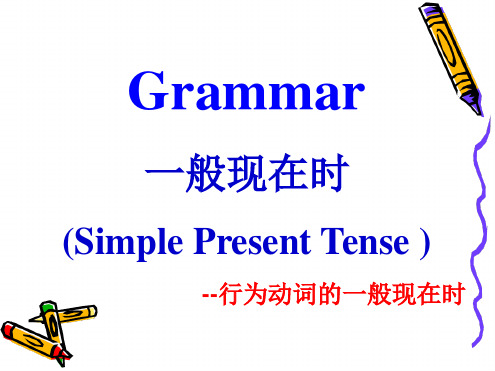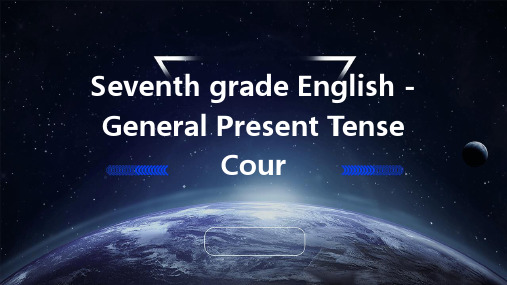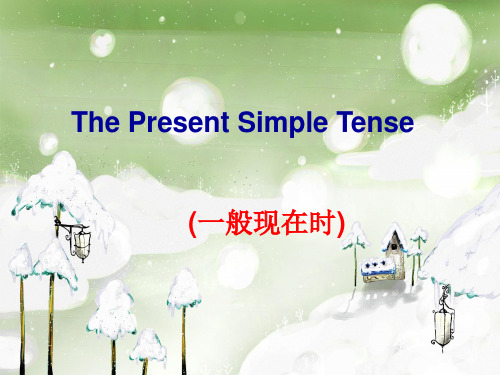(完整版)七年级一般现在时课件
合集下载
七年级英语一般现在时PPT课件.ppt

7. I often __p_l_a_yfootball at weekends. (play) 8. Simon's father often __w__a_t_cfhooetsball games on
TV. (watch)
9. Millie __r_e_a_d_ sbooks at home. (read)
2、连系动词 例句:He is ten years old .
I feel happy .
3、助动词 例句:Do you have a sister?
He doesn't speak English.
4、情态动词
例句:We must go now.
She can speak English.
一般现在时的构成:
My name is Amy. He is ten years old.
---be动词的一般现在时。 I often play football after school.
He watches TV every day. -----行为动词的一般现在时
动词的种类
行为动词的一般现在时的构成:(看例句并总结规律, 注意观察红色和蓝色字体。) 1、I play football every day . 2、You play football every day . 3、My friends play football every day . 4、He plays football every day . 5、Tom plays football every day . 6、My brother plays football every day . 总结规律: 当主语是第一、第二人称和第三人称复数时,行为动 词使用其原形。当主语是第三人称单数时,行为动词 使用其第三人称单数形式。 行为动词一般现在时的第三人称单数形式
一般现在时ppt课件完整版

不可数名词作主语时,谓语动词用单数 形式。
可数名词单数作主语时,谓语动词也用 单数形式。
例如:Water is essential for life.(水 对生命至关重要。)/ A book is on the table.(一本书在桌子上。)
例外情况总结
当主语为并列主语时,谓语动词的数要与靠近它的主语保持一致。
练习3答案
reads。解析:主语 She 是第三人称单数 ,且时间状语为 on weekends,表示经 常性动作,所以谓语动词要用单数形式 reads。
THANKS
时间状语分类及举例
表示经常性或习惯性的动作
always, usually, often, sometimes
表示现在的状态或特征
now, at present, these days
表示普遍真理或客观事实
in general, as a rule
频率副词分类及举例
01
高频副词
always, constantly, continually
注意区分完全否定和部分否定。完全 否定表示全部否定,而部分否定表示 部分否定。例如,“None of the students passed the exam.”(没 有一个学生通过了考试)是完全否定 ;“Not all of the students passed the exam.”(并非所有学生都通过 了考试)是部分否定。
does he work?等。
动词短语和情态动词的变化规则
03
动词短语中的动词和情态动词后接动词原形,如I can swim,
they often go out等。
02 肯定句结构与用法
主语+动词原形+其他成分
七年级一般现在时课件PPT

示例
Do you like apples? 你喜 欢苹果吗?
Am/Is/Are引导的一般疑问句
01
结构
Am/Is/Are + 主语 + 其他?
02
用法
用于询问对方或第三方的身份、特征或状态,其中Am用于第一人称单
数,Is用于第三人称单数和不可数名词,Are用于其他人称和复数。
03
示例
Are they your friends? 他们是你的朋友吗?
用所给动词的适当形式填空
2. My father _______ (work) in a bank. He _______ (go) to work by bus every day.
07
总结回顾与拓展延伸
重点内容回顾
01
02
03
04
一般现在时的定义:表示经常 性、习惯性或普遍性的动作或 状态,以及客观真理或事实。
示例与练习
示例
What do you usually do on weekends? 你周末通常做什 么?
练习
根据所给情境,构造特殊疑问句并给出相应回答。例如,针 对“我昨天去了图书馆”这一情境,可以构造特殊疑问句 “Where did you go yesterday?”并回答“I went to the library yesterday.”。
示例与练习
示例:将陈述句“He likes
playing basketball.”改为一
般疑问句。
01
答案:Does he like playing
basketball?
02
练习:将以下陈述句改为一般
疑问句。
03
She has a new bike.
七年级英语一般现在时课件

单击此处可添加副标题
Ⅱ、构成形式:
肯定式 主语 + be (am/is/are)+表语 I am a student. It/ She/He is a teacher. You/They are classmates. 主语 +情态动词(can, must, may, need, shall) I can speak English. She must go to school.
变否定句:I don’t run very fast . e.g. I run very fast.
变否定句:She doesn’t like Maths.
肯定否定回答:Yes, she does. No, she doesn’t.
肯定否定回答:Yes, I do. No, I don’t. e.g. She likes Maths.
1
2
3
4
5
6
注意:在一般现在时态中,当谓语动词是行为动词的时候,变否定和一般疑问句时,要借助助动词do和does帮忙。当主语是第三人称单数(she, he, it)的时候用does,其他人称用do. 借助助动词do和does以后,动词要用动词原形。
1、表示目前或现在存在的状态或特征. e.g. She is often late. 2、表示客观存在及普遍真理。 e.g. The earth is round. 3、表示现在经常和习惯性发生的动作,常与 sometimes, often, usually, always, everyday… 等时间状语连用。 4、在时间状语从句中表示将来发生的动作。 e.g. If it doesn’t rain tomorrow, we’ll go to the park. 5、表示按时间或计划将要发生的动作,常与时 间状语连用,常用动词为: come, begin, go, leave, arrive, stop, start, return, E.g. Our holidays begin in a week.
七年级英语-一般现在时课件(很实用)

definition
characteristic
Simple - It is the simplest tense in terms of structure, as it does not have any助动词 or情态动词. It only has a verb, subject and object if necessary.
Summary
Students are given sentences in English and asked to translate them into their native language, emphasizing the use of the simple present tense.
It is the most basic tense in English grammar, and is the default tense when English speakers want to communicate an action or state that is not specifically related to any particular time in the past, present, or future.
Comparison with the present continuous tense
Practice and consolidation of the simple present tense
05
This practice involves providing students with sentences missing the simple present tense verbs and asking them to fill in the blanks with the correct verbs.
初一一般现在时PPT课件

第13页/共23页
二、行为动词的一般现在时
We clean our classroom after class. They go to school on foot every day.
经常性或习惯性的动作 He lives in Beijing. I like English very much.
No, S(人称代词)+ am not/isn't/aren't. 1.This is an apple.(变一般疑问句并回答) 2.I am a teacher.(变一般疑问句并回答) 3.My mother is beautiful.(变一般疑问句并回答)
第10页/共23页
1.This is an apple.
第8页/共23页
否定句: S + am/is/are not +表语 S + am not/ isn't/ aren't +表语 They are stud般疑问句: Is / Are + S + 表语?
肯定回答:Yes, S(人称代词) + am/is/are. 否定回答:
第1页/共23页
一般现在时
一、系动词be的一般现在时 二、行为动词的一般现在时
第2页/共23页
一、系动词be的一般现在时
be动词有哪些?
第3页/共23页
am
is
怎么用?
are
第4页/共23页
be动词用法口诀: 我用am, 你用are, is 用于他她它。 单数 is, 复数are。
第5页/共23页
Exercise:用be动词填空 1.She ___ a good teacher. 2. We ____at school. 3. Daming ___ very nice. 4. It ____ sunny today. 5. She and I ____friends. 6. ____ your father a doctor? 7. This apple ____ his. 8. ____ you a good girl? 9. I ____ a good student. 10. Books ____ our friends.
二、行为动词的一般现在时
We clean our classroom after class. They go to school on foot every day.
经常性或习惯性的动作 He lives in Beijing. I like English very much.
No, S(人称代词)+ am not/isn't/aren't. 1.This is an apple.(变一般疑问句并回答) 2.I am a teacher.(变一般疑问句并回答) 3.My mother is beautiful.(变一般疑问句并回答)
第10页/共23页
1.This is an apple.
第8页/共23页
否定句: S + am/is/are not +表语 S + am not/ isn't/ aren't +表语 They are stud般疑问句: Is / Are + S + 表语?
肯定回答:Yes, S(人称代词) + am/is/are. 否定回答:
第1页/共23页
一般现在时
一、系动词be的一般现在时 二、行为动词的一般现在时
第2页/共23页
一、系动词be的一般现在时
be动词有哪些?
第3页/共23页
am
is
怎么用?
are
第4页/共23页
be动词用法口诀: 我用am, 你用are, is 用于他她它。 单数 is, 复数are。
第5页/共23页
Exercise:用be动词填空 1.She ___ a good teacher. 2. We ____at school. 3. Daming ___ very nice. 4. It ____ sunny today. 5. She and I ____friends. 6. ____ your father a doctor? 7. This apple ____ his. 8. ____ you a good girl? 9. I ____ a good student. 10. Books ____ our friends.
七年级一般现在时讲解PPT课件

She does not like bananas.
否定句:doesn’t +V(原) 一般疑问句:does提前 +V(原)
They do not like bannanas? Yes, I do.
Does he like bananas? Yes, he does.
The Present Simple Tense (一般现在时)
1
标题添加
点击此处输入相 关文本内容
标题添加
点击此处输入相 关文本内容
总体概述
点击此处输入 相关文本内容
点击此处输入 相关文本内容
2
Which one do you play every day? I play basketball every day.
Does she like bananas? No, she does not.
Do they like bananas? Yes, they does. 8
Now look at these sentences carefully. Pay attention to their verbs and subjects:
2)表示现阶段存在的状态、特征或心理活动。
Do and think
How can we name this habit of
liking a kind of fruit?
4
The definition of The Present Simple Tense: He plays volleyball every day. (1) 表示经常性习惯性的动作。 She likes bananas. (2)表示现阶段存在的状态、特征或心理活动。
I play soccer ball every day.
最新初中一般现在时完整版教学讲义PPT课件

• every
• day • year • month • week • morning • afternoon • evening
2、频率副词
never
seldom
rarely
sometimes
often
usually
always
3 一般现在时第三人称单he,she,it 的构成规则
1、一般动词,在词尾加 s ; 如: work--works, live--lives, play--plays, sing-- sings.
2. Kate comes from America. Kate works with Peter
Kate doesn’t come from America.Kate doesn’t work with Peter.
1. I am Chinese, and I am a student. I am not Chinese, and I am not a student
is not=isn’t
are not=aren’t
2.(do) 当 主 语 是 单 数 第 三 人 称 时 , 它 与 助 动 词 DOES 有 关 , 但 是 动 词 谓 语 一定要恢复为原形。当主语是其他人 称时,它与助动词DO有关。
I like English.
She likes it very much否. 定句
eg: She lives in Ningbo. 她住在宁波。
2、以/s/ /z/ 等音素结尾的动词,词尾加 -es ,如词尾为e, 只加-s. 读作 /iz /如:
teach------ teaches,
wash----- washes.
eg: My mother washes the coat.我母亲洗了大衣。
相关主题
- 1、下载文档前请自行甄别文档内容的完整性,平台不提供额外的编辑、内容补充、找答案等附加服务。
- 2、"仅部分预览"的文档,不可在线预览部分如存在完整性等问题,可反馈申请退款(可完整预览的文档不适用该条件!)。
- 3、如文档侵犯您的权益,请联系客服反馈,我们会尽快为您处理(人工客服工作时间:9:00-18:30)。
概念:用 yes 或 no 来回答的疑问句叫做一般疑 问句。 1.对于BE 动词,疑问句要求把BE
提前,第一人称的单数和复数 (I/WE),第一变成第二人称。
I am a teacher.
疑
You are a worker. 问
句
He is a student.
We are friends.
Are you a teacher? Are you a worker? Is he a student? Are you friends?
You like the music.
Do you like the music.?
He goes to work by bus . Does he go to work by bus ?
We /You/They like it. Do you/they like it?
将下列各句从肯定式改为否定式
Hainan.
1._____ you have a book ?
A Do B. Are C. Is D. Have
2.Does Li Lei like to watch TV?
______________.
A. Yes, he like.
B. No, he doesn’t .
C. Yes, he’d like. D. No, he likes.
第三人称,动词要用第三人称单数形式。 规则的第三人称单数的变化如下:
1)直接在动词原形后加s; 2)以辅音字母加y结尾的,变y为i加es。 3)以o,x,ch,sh结尾的加es;读/iz/ 4)特殊情况
have--has
陈述句:I play basketball everyday. 一般疑问句:Do you play basketall
3.She doesn’t ______ her homework in
the afternoon.
A. doing B. to do C. does D. do
4.How ____ Mr. Smith ______ to
England?
A. do, go B. is , go
C. does, go D. does , goes
陈述句:The boy always plays basketball.
一般疑问句:Does the boyalways play basketball ? 肯定回答:Yes, he does.
否定回答:No,he doesn't.
否定句:The boy doesn't alwaysplay basketball.
Does the sun rise in the east?
2.Tom gets up at six in the morning. Tom doesn’t get up at six in the morning.
is not=isn’t are not=aren’t
2.对于实意动词,疑问句要求是:当主 语是他(he),她(she),它(it)时,句子前 面加DOES,并把动词恢复原形;当主 语是其他人称时,句前加DO ,第一人 (I/we) 称换第二人称(you)。
I often go there.
Do you often go there ?
We don’t go to school every day.
3.DoMyyoumgootmo swchooorlkesveirny daay?school.
My mom does’t work in a school.
Does your mom work in a school?
III一般疑问句
4.My mother _lo_o__k_s__look) after my little sister
at home. 5. Lucy _h_a_s_____(have) some friends here. 6.Fang Ming _d_o_e_s_n_’__t_l_ik_e__(not like )rice at all. 7.We_g_o___(go)to school at 7:30 in the morning 8.Mary seldom __c_o_m__e_s_ (come) here. 9.Her uncle often _d_r_i_v_e_s_ (drive) to Beijing. 10.Tom _w__a_n_ts_ (want) __to__w_o__rk__ ( work) in
veryday? 肯定回答:Yes, I do. 否定回答:No,Idon't. 否定句:I don't play basketball
everydall.
陈述句:He has a big bookcase. 一般疑问句:Does he have a big
bookcase? 肯定回答:Yes, he does.
陈述句:They have some books. 一般疑问句:Do they have any
books? 肯定回答:Yes,they do. 否定回答:No,they don't. 否定句:They don't have any books.
陈述句:The students like junk food. 一般疑问句:Do the students like junk food?
陈述句:I am a student. 一般疑问句:Are you a student? 肯定回答:Yes,I am. 否定回答:No,I'm not. 否定句:I am not a student.
陈述句:He is a student. 一般疑问句:Is he a student? 肯定回答:Yes, he is. 否定回答:No,he isn't. 否定句:He is not a student.
Ex1.请做练习
1.Her parents live in Shanghai . 否: Her parents__d_o_n_’__t_l_iv_e____ in Shanghai.
疑: __D__o___ her parents___li_v_e__ in Shanghai?.
2.You study English .
肯定回答:Yes,they do. 否定回答:No,they don't. 否定句:They don't like junk food.
Ⅳ 、 就单词的正确形式填空 1.She_lo_o_k_s _(look) tired. 2.The moon_g_o_es (go) round the sun. 3. _M_a_y(may) I have your pencil? 4.Practice _m_a_k_es__(make) perfect. 5.We usually_c_om__e(come) to school earlier. 6.Class_b_e_gi_n_s_ (begin) at eight every morning. 7.When shec_o_m_e_s__(come), we’ll go out to
2)含实义动词的
一般疑问句的变化:用do或does来 提问,前面用了does,后面的动词 要用原形,句中有some的改为any。
否定句的变化:直接在动词原形前加 don't或doesn't,把some改为any。
he
they
she does you
it
we
do
I
he ,she, it用does来提问,其它人称用do 来提问。在陈述句里,主语是he,she,it
3.I am Chinese, and I am a student.
I am not am not a student
4.They know each other.
They don’t know each other.
用所给动词的正确形式填空: 1.We often _p_l_a_y__(play) in the playground. 2.She oftenw_a_tc_h__e_s(watch) TV with her dog. 3.The earth _g_o_e_s__(go) around the sun.
一般现在时
金所中学杨红波
一般现在时
含义:表示经常或反复发生的动作 或存在的状态;也表示主语具备的 性格和能力。
结构:1)含be动词的;
2)含实义动词的。
1)含be动词的
am
he
be is I am she
is
areitthey源自youarewe
一般疑问句的变化: 把be动词提到句首,有some的改为any。 否定句的变化: 在be动词后加not,有some的改为any。
II 一般现在时的否定式
1.Be 动词的否定式: be + not
I am a teacher. You are a worker 否定句 She is a doctor We are friends.
I’m not a teacher You aren’t a worker She isn’t a doctor. We aren’t friends.
go goes watch watches
stay stays fly
flies
teach teaches play plays
将下列句子变成否定式和一般疑问句
1.Her name is Lucy.
Her name isn’t lucy.
2.Is Wsheelugcoy ?to school every day.
陈述句:They are teachers. 一般疑问句:Are they teachers? 肯定回答:Yes, they are. 否定回答:No,they aren't. 否定句: They aren't teachers?
提前,第一人称的单数和复数 (I/WE),第一变成第二人称。
I am a teacher.
疑
You are a worker. 问
句
He is a student.
We are friends.
Are you a teacher? Are you a worker? Is he a student? Are you friends?
You like the music.
Do you like the music.?
He goes to work by bus . Does he go to work by bus ?
We /You/They like it. Do you/they like it?
将下列各句从肯定式改为否定式
Hainan.
1._____ you have a book ?
A Do B. Are C. Is D. Have
2.Does Li Lei like to watch TV?
______________.
A. Yes, he like.
B. No, he doesn’t .
C. Yes, he’d like. D. No, he likes.
第三人称,动词要用第三人称单数形式。 规则的第三人称单数的变化如下:
1)直接在动词原形后加s; 2)以辅音字母加y结尾的,变y为i加es。 3)以o,x,ch,sh结尾的加es;读/iz/ 4)特殊情况
have--has
陈述句:I play basketball everyday. 一般疑问句:Do you play basketall
3.She doesn’t ______ her homework in
the afternoon.
A. doing B. to do C. does D. do
4.How ____ Mr. Smith ______ to
England?
A. do, go B. is , go
C. does, go D. does , goes
陈述句:The boy always plays basketball.
一般疑问句:Does the boyalways play basketball ? 肯定回答:Yes, he does.
否定回答:No,he doesn't.
否定句:The boy doesn't alwaysplay basketball.
Does the sun rise in the east?
2.Tom gets up at six in the morning. Tom doesn’t get up at six in the morning.
is not=isn’t are not=aren’t
2.对于实意动词,疑问句要求是:当主 语是他(he),她(she),它(it)时,句子前 面加DOES,并把动词恢复原形;当主 语是其他人称时,句前加DO ,第一人 (I/we) 称换第二人称(you)。
I often go there.
Do you often go there ?
We don’t go to school every day.
3.DoMyyoumgootmo swchooorlkesveirny daay?school.
My mom does’t work in a school.
Does your mom work in a school?
III一般疑问句
4.My mother _lo_o__k_s__look) after my little sister
at home. 5. Lucy _h_a_s_____(have) some friends here. 6.Fang Ming _d_o_e_s_n_’__t_l_ik_e__(not like )rice at all. 7.We_g_o___(go)to school at 7:30 in the morning 8.Mary seldom __c_o_m__e_s_ (come) here. 9.Her uncle often _d_r_i_v_e_s_ (drive) to Beijing. 10.Tom _w__a_n_ts_ (want) __to__w_o__rk__ ( work) in
veryday? 肯定回答:Yes, I do. 否定回答:No,Idon't. 否定句:I don't play basketball
everydall.
陈述句:He has a big bookcase. 一般疑问句:Does he have a big
bookcase? 肯定回答:Yes, he does.
陈述句:They have some books. 一般疑问句:Do they have any
books? 肯定回答:Yes,they do. 否定回答:No,they don't. 否定句:They don't have any books.
陈述句:The students like junk food. 一般疑问句:Do the students like junk food?
陈述句:I am a student. 一般疑问句:Are you a student? 肯定回答:Yes,I am. 否定回答:No,I'm not. 否定句:I am not a student.
陈述句:He is a student. 一般疑问句:Is he a student? 肯定回答:Yes, he is. 否定回答:No,he isn't. 否定句:He is not a student.
Ex1.请做练习
1.Her parents live in Shanghai . 否: Her parents__d_o_n_’__t_l_iv_e____ in Shanghai.
疑: __D__o___ her parents___li_v_e__ in Shanghai?.
2.You study English .
肯定回答:Yes,they do. 否定回答:No,they don't. 否定句:They don't like junk food.
Ⅳ 、 就单词的正确形式填空 1.She_lo_o_k_s _(look) tired. 2.The moon_g_o_es (go) round the sun. 3. _M_a_y(may) I have your pencil? 4.Practice _m_a_k_es__(make) perfect. 5.We usually_c_om__e(come) to school earlier. 6.Class_b_e_gi_n_s_ (begin) at eight every morning. 7.When shec_o_m_e_s__(come), we’ll go out to
2)含实义动词的
一般疑问句的变化:用do或does来 提问,前面用了does,后面的动词 要用原形,句中有some的改为any。
否定句的变化:直接在动词原形前加 don't或doesn't,把some改为any。
he
they
she does you
it
we
do
I
he ,she, it用does来提问,其它人称用do 来提问。在陈述句里,主语是he,she,it
3.I am Chinese, and I am a student.
I am not am not a student
4.They know each other.
They don’t know each other.
用所给动词的正确形式填空: 1.We often _p_l_a_y__(play) in the playground. 2.She oftenw_a_tc_h__e_s(watch) TV with her dog. 3.The earth _g_o_e_s__(go) around the sun.
一般现在时
金所中学杨红波
一般现在时
含义:表示经常或反复发生的动作 或存在的状态;也表示主语具备的 性格和能力。
结构:1)含be动词的;
2)含实义动词的。
1)含be动词的
am
he
be is I am she
is
areitthey源自youarewe
一般疑问句的变化: 把be动词提到句首,有some的改为any。 否定句的变化: 在be动词后加not,有some的改为any。
II 一般现在时的否定式
1.Be 动词的否定式: be + not
I am a teacher. You are a worker 否定句 She is a doctor We are friends.
I’m not a teacher You aren’t a worker She isn’t a doctor. We aren’t friends.
go goes watch watches
stay stays fly
flies
teach teaches play plays
将下列句子变成否定式和一般疑问句
1.Her name is Lucy.
Her name isn’t lucy.
2.Is Wsheelugcoy ?to school every day.
陈述句:They are teachers. 一般疑问句:Are they teachers? 肯定回答:Yes, they are. 否定回答:No,they aren't. 否定句: They aren't teachers?
